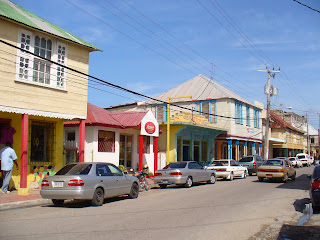
The small town of Black River, capital of St Elizabeth Parish on the south west coast of Jamaica, is my place of work and home for four weeks. It’s a small place, but its population of 5,000 makes it one of the larger urban centres of the Parish. The main street, running parallel to the rocky coast line, is bustling during the day; street hawkers ply their goods, old women lay out their yard’s produce in the back alleys, taxi drivers shout noisily for your custom, men saunter lazily in the shade of the colonnaded pavement; reggae music wafts from one of the clothes shops whilst down the road a sound system mounted on a car roof blasts out loud gospel music, advertising God to the passersby. Heat beats down, permeating the air and saturating your clothes with perspiration. Everything is loud; people are everywhere. The smell of petrol, sea salt, roadside Jerk stalls and detergent are intoxicating. The bustling market is alive with atmosphere: vendors sell every small good you could think of from ramshackle huts, most no bigger than garden sheds or Wendy Houses – haircuts, clothes, fruit, vegetables, meats, spare parts for various appliances. At night, it’s a different story: the place is a ghost town.
It is not much of tourist destination; its main attraction is the river of the same name, Jamaica’s longest. Black River is a refuge to most of Jamaica’s surviving crocodiles; it draws its water from the surrounding Great Morass, an area of swampy and ecologically vital wetland that spreads out to the north of the town. Tourists come to Black River for the famous river safaris, a must for those interested in wildlife – and those who want to hand feed the largely tame crocodiles!
My office is in the yard behind the large white courthouse, a grand and imposing neo-classical structure, now with peeling paint, missing window panes, and goats skittering through its open air corridor. The complex of outhouses in the yard behind is now the nerve centre governing the Parish; here is the Mayor’s Office (grandiosely named ‘Mayor’s Parlour’), the planning department, revenue department, buildings department, the run-down poor relief department with its missing door, and my own office – the Disaster Preparedness Office.

Yet Black River has not always been so sleepy. It’s architecture, most of it in a perilous state of near collapse, tells a different story. At the turn of the nineteenth century, the burgeoning logwood industry turned Black River into a boom town, second only to Kingston. The High Street is lined with pretty Georgian mansions of varying pastel shades, colonnaded verandas and gingerbread trim, built by the entrepreneurs of past ages. It was the first town in Jamaica to be supplied with electricity; the first to have a motor car; the first to have a telephone. But its glory faded with the passing importance of the logwood trade; the spa and racecourse are now derelict, the houses falling in around their owner’s ears. The confidence of the town’s architecture is now faded with time and neglect, colours muted and weather beaten.
No comments:
Post a Comment